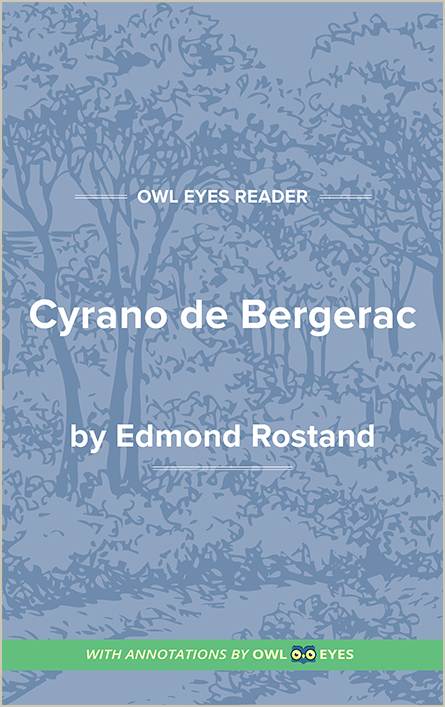Analysis Pages
Vocabulary in Cyrano de Bergerac
Vocabulary Examples in Cyrano de Bergerac:
Act I - Scene II
🔒"Messieurs..." See in text (Act I - Scene II)
"candelabra..." See in text (Act I - Scene II)
"Tomorrow I join the Guards, in the Cadets..." See in text (Act I - Scene II)
"ode..." See in text (Act I - Scene II)
"triolet..." See in text (Act I - Scene II)
Act I - Scene IV
🔒"barbarian..." See in text (Act I - Scene IV)
"Aristophanes’ hippocampelephantocamelos..." See in text (Act I - Scene IV)
"Sic transit..." See in text (Act I - Scene IV)
"farce..." See in text (Act I - Scene IV)
Act II - The Poet's Eating-House
🔒"game..." See in text (Act II - The Poet's Eating-House)
Act II - Scene I
🔒"couplet..." See in text (Act II - Scene I)
Act II - Scene III
🔒"silhouettes..." See in text (Act II - Scene III)
Act II - Scene IV
🔒"laughing-stock..." See in text (Act II - Scene IV)
"woos..." See in text (Act II - Scene IV)
Act II - Scene VI
🔒"regiment..." See in text (Act II - Scene VI)
Act II - Scene VII
🔒"pentacrostic..." See in text (Act II - Scene VII)
Act II - Scene VIII
🔒"pleat..." See in text (Act II - Scene VIII)
"madrigals..." See in text (Act II - Scene VIII)
Act III - Roxane's Kiss
🔒"square..." See in text (Act III - Roxane's Kiss)
Act III - Scene I
🔒"demi-semi-quaver..." See in text (Act III - Scene I)
Act III - Scene II
🔒"laymen..." See in text (Act III - Scene II)
"syndic..." See in text (Act III - Scene II)
Act IV - Scene I
🔒"besiegers..." See in text (Act IV - Scene I)
Act IV - Scene II
🔒"reveille..." See in text (Act IV - Scene II)
Act IV - Scene III
🔒"hearthstones..." See in text (Act IV - Scene III)
"minuet..." See in text (Act IV - Scene III)
Act IV - Scene IV
🔒"harbor..." See in text (Act IV - Scene IV)
Act IV - Scene V
🔒"gallant..." See in text (Act IV - Scene V)
Act IV - Scene VI
🔒"lance..." See in text (Act IV - Scene VI)
Act IV - Scene VII
🔒"blockaded..." See in text (Act IV - Scene VII)
"intoxicating..." See in text (Act IV - Scene VII)
"recoil..." See in text (Act IV - Scene VII)
Act V - Scene I
🔒"habits..." See in text (Act V - Scene I)
Act V - Scene II
🔒"Lute..." See in text (Act V - Scene II)
Act V - Scene III
🔒"colonnade..." See in text (Act V - Scene III)
"lackey..." See in text (Act V - Scene III)
Act V - Scene V
🔒"Court Gazette..." See in text (Act V - Scene V)

